#which seems positive!
Text
oh also i never told the beloved circle of mutuals who like all my posts bewailing the horrors of my academic life that i have got an mphil offer from my current university!! i need to get a first in my undergrad degree, which is far from a given, and i kind of need to be given at least partial funding too, but it is a first step!!
#i also have like... pretty much got an offer from another university?#i haven't submitted my application yet bc my referees have not been quick on the draw#but i have a supervisor who would like to take me on there and the head of PG admissions spontaneously emailed me#saying that supervisor had been in touch w/ him and that i should submit my application when i'm ready and he'd sort it#which seems positive!#no funding there except for one long shot application but the fees are also about 8 grand less#so that's nice
10 notes
·
View notes
Text
anyone else have multiple traumatic memories associated specifically with holidays/family vacations? because that is a topic I never see discussed in all the So You Had A Shitty Childhood, Now What? self-help books i've been reading. but for me, it was a significant thing. and the more i think about it the more it seems like this would be an (unfortunately) common experience. would be grateful to hear if this matches other peoples' experiences...
#not a shitpost#serious post#ask to tag#tw trauma#cptsd#c-ptsd#and if so we should TALK about it#because it means there are a whole group of survivors out there whose mental health regularly worsens during holidays#like i know i am most certainly not the only person who feels an undefined Dread hanging over christmas/my birthday/july 4 etc#bc too many shitty things happened during those times and now my brain is hypervigilant bc traditionally these are the Danger Times#and this seems like it would be particularly common for survivors of abusive/dysfunctional households (aka most people with c-ptsd)#because holidays/vacations typically mean 1) the whole family is together/being forced to interact#2) and undergoing external stressors e.g. travel/relatives aka 'outsiders' visiting/routines & coping mechanisms being interrupted etc#3) there is social pressure for this to be a Fun Family Bonding Experience which only highlights the cracks in the foundation#and exposes the common Everything Is Fine/We Are A Happy Family lie#4) the cognitive dissonance of feeling tired/anxious/stressed/afraid during a time when you are 'supposed' to be Making Good Memories#and then everyone is angry/tired/anxious/triggered and things boil over and something or someone goes Very Wrong#weird that i'm posting this in october when halloween is...sort of the ONLY holiday i have only good and happy feelings towards#i got lucky there#also i have positive feelings towards Labor Day but that's for socialist reasons
4K notes
·
View notes
Text
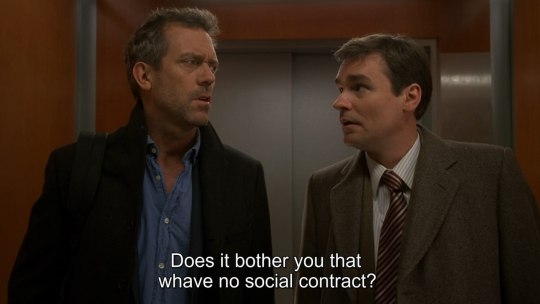

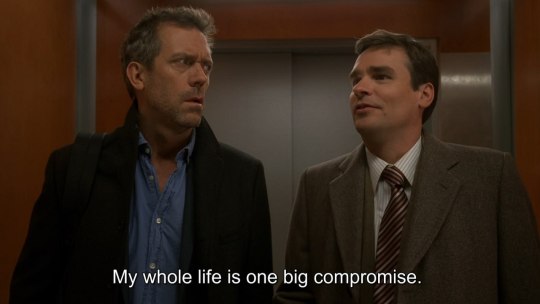

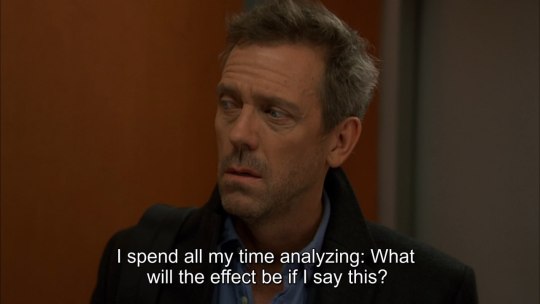
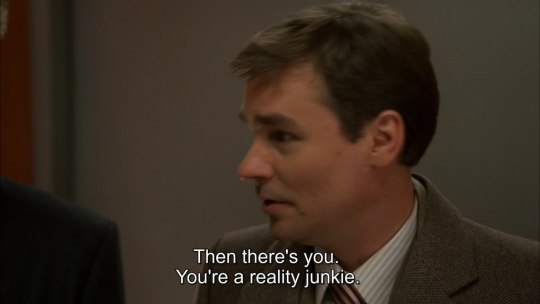

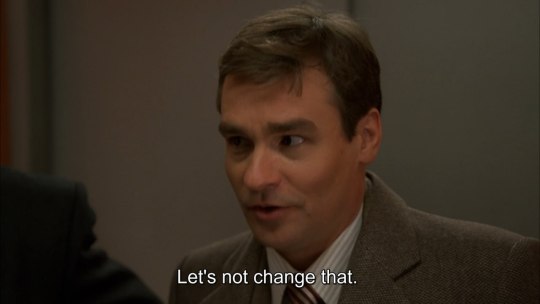

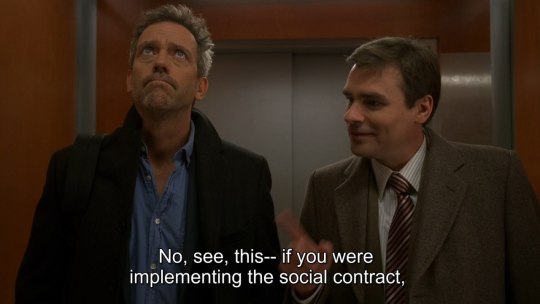
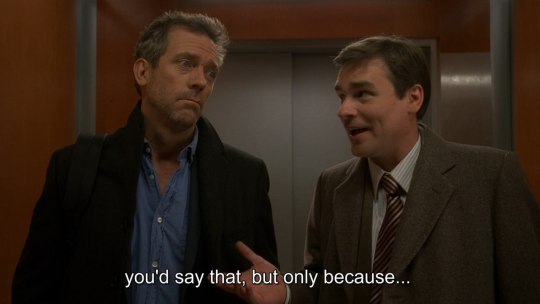
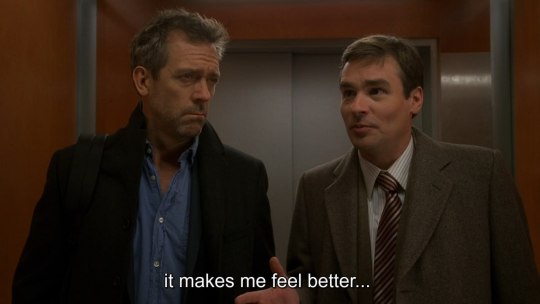
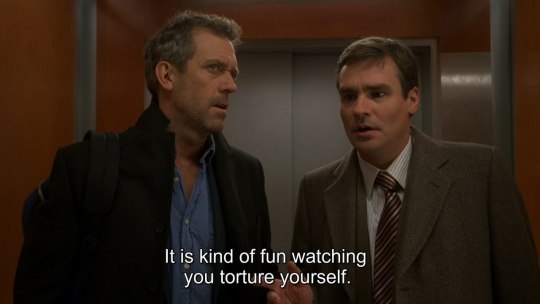
#house md#gregory house#james wilson#hilson#long post#longpost#screencap#s05e17 “The Social Contract”#amazing interaction#wilson thinks that when he doesnt filter himself its a “reality” things he saying#very close to the position of “im not an asshole im just being real”#which makes sense only if you dont have much experience#and it seems wilson only does it with house#a georg of any data pool#and yeah babe this is still social contract you not escaping it by just labeling it differently#hes even arriving at that point at the end there#and house was already “there” earlier in the episode hes just doing it back to wilson now#im unwell and house would not cure me
559 notes
·
View notes
Text
okay so the main criticism i've been seeing against episode 8 is that beelzebub (among other things) is "too nice" to be the sin of gluttony, because she's an attentive hostess, because she expresses worry over blitz's excess drinking, etc., and i wanna talk about it.
the thing is, i feel like this complaint is rooted in the most basic, somewhat cliche idea of the sin of gluttony, and a somewhat boring approach to bee's character in general. the idea is that, as the sin of gluttony, bee should be encouraging over-indulgence, excess, and the self-destructive aspects of party culture and drinking.
but she's the queen bee. she clearly explains that she can feel the "energy" of everyone at her party, and i think that's very important to analyzing exactly what gluttony means to her. instead of indulging in food and alcohol and drugs and being selfish (as gluttony is generally expected to be about), bee feeds on the ENERGY of the demons around her. and in order to get the best energy she can, she needs to be making sure everyone is actually having FUN and having a good time. gluttony, in this sense, is about EXTRAVAGANCE, having the best quality of everything, rather than just everything in general.
i also think this is why she was so put-off by blitz's actions. when he chugs the entire barrel of alcohol and then is absolutely wasted beyond all reason for the rest of the party, he's NOT actually engaging in her sin. he's not being gluttonous; he's not drinking to have a good time or to indulge or to have fun - he's drowning himself in alcohol because he's trying to forget and ignore all his problems, which is a sin much more akin to pride. his energy feels bad to bee because he's not having fun, he's deeply hurt and trying to distract himself by being self-destructive, which is NOT what her sin is about.
(also, remember, this is supposed to be part TWO of the finale. meaning, this episode (and the introduction of bee's character) directly goes hand-in-hand with the introduction of asmodeus, who's entire club IS about indulgence and depravity and everything you'd expect from the sin of lust. bee and the gluttony party are meant to be a direct foil to the energy of ozzie's.)
#like. gluttony is about the best QUALITY of everything of wanting the best that you can get#as opposed to lust or greed; which seem to be more about depravity and wanting EVERYTHING#also like. something so so good about gluttony being all about the positive aspects of party culture#the joy the color the vibrancy; encouraging moderation and being an attentive host etc etc#like what a subversion of expectations. i think it works SO well and stands as a really good foil to most of the other sins we've seen#anyway. rant done#mine#helluva boss#helluva boss spoilers#helluva boss queen bee#helluva boss beelzebub#beelzebub helluva boss#beelzebub#e: queen bee#analysis
2K notes
·
View notes
Note
Imagine if Machete was Muslim instead of Catholic. His name would be something like Saif سيف, and Vasco would probably be something like Dhahabi ذَهَبِيّ
.
#I don't know Arabic so I can't weigh in that much but if you say so!#it seems like these mean “sword” and “golden” respectively that's neat#Machete wouldn't be able to cling to his Catholic guilt in that case#I don't think Islam has the same concept of original sin that Christianity does#I'm simplifying but it's a belief that humans are born with an innate tendency for evil sinning is part of our nature#and staying on the positive and in God's good graces requires a lot of repentance which can lead to excess guilt and shame#I could be wrong but I'm under the impression that this idea of a manufacturing error is a very Christian thing#sorry I know you didn't sign up to hear me try to talk about big theology things and I don't want to make it weird#but I find this stuff really interesting I unironically like to read and think about how religions work#and how they shape things they come in contact with#in Machete's case in particular his troubled relationship with God and his career choice are big parts of his character#and why he turned the way he did and thinks the way he does you know#answered#kachavashka#Dhahabi is such a regal sounding name#I'd steal that in a heartbeat if I didn't already have one extremely gold-coded character
221 notes
·
View notes
Text
Something I've been thinking about is how Patrick O'Brian manages so skillfully to write characters whose actions contradict their beliefs, which I think is honestly a big part of why his characters feel so real. Mostly with Stephen and Jack—e.g., and perhaps most notably, Stephen has notably leftist sympathies (honestly I have no idea how to characterize his politics in period terms) who nonetheless becomes very comfortable with his rise to the landed gentry, while Jack is a card-carrying Tory who much of the time sympathizes far more with working class sailors and farmers than with the upper classes—but I'm sure he does it to a lesser degree with some of his minor characters (James Dillon, while perhaps not precisely minor, comes to mind), and I love that he's able to do that, especially the way in which he embeds it in the narrative. We see how they're all unreliable narrators of themselves; we understand how they want to be seen and how that does and doesn't coincide with the reality, but most importantly, this isn't presented as something reprehensible, just as a part of their own humanity. They are not their expectations for themselves, but they don't need to be those expectations to be beloved.
#stephen is especially guilty of this and i think it's very interesting how he thinks of himself versus how he acts#which is probably an essay on its own#but i do think that this is another point he and jack make a fun foil on#(for jack this manifests much less explicitly but i think it's definitely still there)#i can't think of other characters atm besides james dillon#(who okay. his actions don't contradict his beliefs exactly but there is a weird and complex relationship between them)#though i do suspect that there are probably more#idk i've been thinking about this a lot because o'brianizing hornblower has brought to the forefront#how different those two authors treat internal/external narratives#patrick o'brian is kind of like yeah they don't really line up but that's okay that's just what it's like to be a person#while for hornblower and cs forester it's like the internal narrative is so unbelievably unreliable and negative#but the external narrative also seems to be resoundingly positive#(which is probably why. in my humble opinion having watched two episodes of it. the tv show is much more Fun)#writing hornblower in o'brian format is just like wow there is no weirdness going on did i write him wrong#but no it's hornblower he just sounds so much more normal without the 24/7 mental gymnastics#perce rambles#aubreyad
78 notes
·
View notes
Text
I think, in a lot of ways, Monika and Sayori are reflections of each other.
Really, I think all of the girls are similar in a lot of their issues (self-esteem, anxiety, etc) and that's something emphasized in a lot of the stories, and a big part of why they all gravitate towards each other and work to create the club as a safe space for all of them, but I think Monika and Sayori in particular are just very much alike.
I think Trust really emphasized this similarity in the reveal of Sayori's poem, Become the Flower.
Prior to shifting focus onto the poem, Monika talks to herself about her real vision for the Literature Club. I think here, Monika points out what Sayori actually meant when she said that Monika was "trying to make the club [she] needs the most, out of anyone", even if she doesn't actually realize that yet. It's pretty clear that when she says that literature is a window to the real self underneath the person who's "forced to always smile and blend in", and is "forced to be perfect", she's really talking about herself.
I think that a lot of Monika's character throughout Trust is expressed more subtly, often in a roundabout way like this. A huge part of the story is centered around Monika's own personal struggles expressing herself, and that trait is pretty well exemplified in this indirect way of talking about her own struggles. I think that the reason why Monika's characterization here is so subtle overall is reflective of this.
And I think it's pretty blatant that this is statement is also meant to be reflective of Sayori, given that we immediately move from this statement onto the poem which reveals to Monika that she's been hiding her own problems. In this way, I think Team Salvato wanted to explicitly point out how similar they really are, and draw your attention to it.
I think that the way that Trust as a story is put together is meant to really emphasize just how similar they are even in their differences; spending a great deal of time focusing on Monika's own problems, to then showcase Sayori as the mirror to them.
I think the two of them make a very interesting pair in that respect, because a big similarity they have is that they very much place others above themselves, so they both end up individually building each other up while they put themselves down. It creates this strange back and forth where they each insist they suck and the other is great, when the reality is that they're both pretty fantastic.
In the statement Monika made to herself about her vision of the club, while it's clear she's talking about herself, she frames it in the context of somebody else getting those benefits out of the Literature Club, rather than herself. Throughout the entirety of Trust, she speaks dismissively of her efforts and her problems alike, while pointing out that Sayori is providing a lot of help. Sayori by contrast spends most of her time hyping her up and points out, explicitly, that Monika doesn't give herself enough credit. She also dismisses her own efforts, pointing out in most things she does, up into the climax, that Monika is a lot better than her at whatever she's doing. And when Sayori's problems are actually revealed, she explicitly says that she doesn't want Monika to worry about her, and that she doesn't want to have this conversation.
I think this all really shows that both of them are averse to tackling their own problems head-on, and I think this comes out of a fear of being vulnerable, since that's directly mentioned several times in Monika's issues openly expressing herself.
I think what makes Monika's particular brand of self-negging quite so disheartening is that she dismisses it out of hand as her being silly and dramatic, and in that way, she doesn't actually address the fundamental problem underlying it, nor does she actually address the statements themselves as incorrect. The amount of time she spends talking down her own problems as something trivial and silly, particularly in comparison to Sayori's problems, are a manifestation of her own desire to avoid the vulnerability of even having these problems, and it's just...heartbreaking. Sayori's denial is its own can of worms, but Monika's ability to so consistently minimize her issues when they are clearly still impacting her is so uniquely troublesome.
I think a big difference between the two of them in that respect is that Monika wears significantly more of her heart on her sleeve, so Sayori finds it a lot easier to directly target Monika's problems than Monika does in the reverse, but their individual habits of avoidance are coming from the same place.
I'm traveling a bit aimlessly in this essay, trying to tie things together nicely as I see them, but there are just a lot of similarities I notice between their actions and the way they think that showcase that they have a lot of the same problems, and a huge theme in Trust is expressing oneself, which both Monika and Sayori struggle to do, in much the same way.
I think a key similarity between the two of them is their tendency to catastrophize over a situation when left alone, mostly revolving around seeing the worst possible scenario for how they could've personally messed up the situation. I'm just rewatching Trust for this little essay, so there are two major moments I see Monika doing this, but I remember Sayori doing this...a few times, actually, throughout the side stories.
I think the spiral Monika goes into after reading Become the Flower is particularly important, as it exemplifies the habit of dismissing her own problems fantastically; in this case, she has an excuse. It's true that Monika's issues with her perfectionism seem silly and trivial in comparison to Sayori's, but that's exactly the thing: She shouldn't be comparing them in the first place! Her problems are real, and they clearly cause her distress, but because Sayori's own issues appear so much more serious than hers, she dismisses them wholesale as her being dramatic and silly. Because Monika's problems seem so small, she doesn't see them for the problems they really are. In the same way, because her own accomplishments and work seem so small, she doesn't see them for the accomplishments they are.
This spiral showcases Monika's biggest problem, the reason why she has such trouble expressing herself, and conversely, the exact same problem Sayori has. She doesn't want to be the center of attention.
Put another way, she doesn't think she deserves to be the center of attention. Her problems are so trivial; her accomplishments menial. Her fear of vulnerability isn't a fear that others will hurt her; it's a fear of being selfish.
Sayori is very similar, in that the reason she actively works to avoid showing any possible sign that anything is wrong is because she doesn't want anyone to worry about her. She doesn't want other people to dedicate time and energy to her.
I think that for both of them, this comes from low self-esteem. Sayori is self-explanatory I think, but I'd say Monika's perfectionism makes it exceptionally difficult for her to really feel accomplished in anything she does, which, coupled with her constant preoccupation with how she appears to other people (I think Monika places very high expectations on herself. I mean, Trust literally starts with her frantically apologizing and saying "I normally don't ever do this!" when Sayori finds her napping) makes it very difficult for her to feel confident in herself.
The fear both Sayori and Monika have in being vulnerable isn't that people will use that vulnerability to hurt them.
It's that people will try to help them.
And I think that's a really big part of why Sayori feels like she can trust Monika with her darkest thoughts, because she understands that they're the same in a lot of ways.
Monika created the club which she needed the most...and it was also the club Sayori needed the most, for the exact same reason.
I think it's kinda easy to overlook a lot of this because of the sheer amount of focus placed onto Sayori and the more explicit issue Monika has (insofar as the plot is concerned), but I think Sayori is exactly what Monika needs just as much as Monika is what Sayori needs.
#i'll probably be making a lot more of these sorts of essays on different characters + side stories#i just noticed this and thoughts it was really interesting to look at#i think there's not a whole lot of focus given to monika as a character through the side stories in general outside of this#probably because the base game gives so much#i think this is a really interesting showcase of the pressure of this expectation which monika has of herself to be perfect#one thing i didn't mention here is that monika seems to outright reject the authority/seriousness of the club president position#i think another similarity between the two of them is that monika seems to use humor to soften things which make her uncomfortable#which based on the flippant way she talks about setting an example as club president specifically#it seems like she's not exactly confident in acting as an authority in her position#idk i really have a lot to say about them. both individually and together.#musings#ddlc monika#ddlc sayori#ddlc#doki doki literature club
80 notes
·
View notes
Text
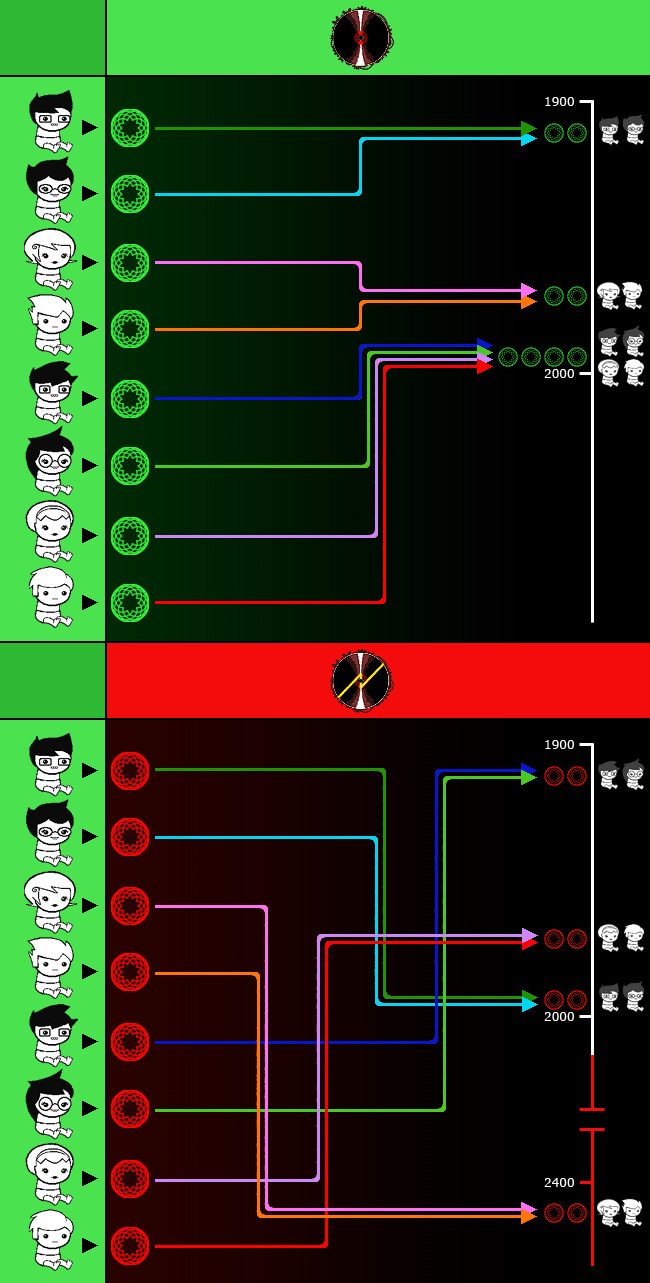
Thinking about what this means for the guardian Strilondes' age.
edit: I've made a follow-up to this post.
#for one that means Mom and Bro are the same age give or take a few months#also their position in the timeline probably means they arrived in the 70's? 1975 maybe?#It'll means they were 20 when their charge arrived and 33 during SBURB#which seems like a coherent age#June Egbert#Rose Lalonde#Dave Strider#Jade Harley#beta kids#Jane Crocker#Jake English#Roxy Lalonde#Dirk Strider#alpha kids#Nanna Egbert#Mom Lalonde#Gpa Harley#Bro Strider#Poppop Crocker#alpha Dave Strider#alpha Rose Lalonde#Gma English#meta#homestuck
182 notes
·
View notes
Text
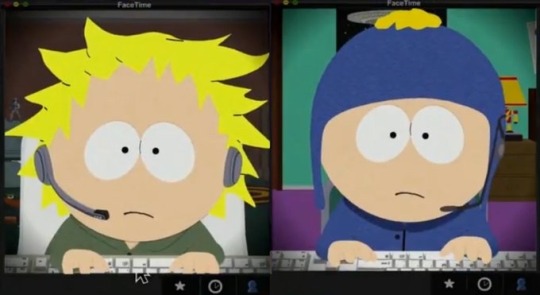
have you ever been insanely jealous of what two gay fourthgraders have
#i cropped the picture so that it seemed like they are on discord together#oh fuck its not discord#well#also i have a sudden burst of positive feelings for creek which is weird i mean theyre not even my main otp bow#sp#south park#creek#sp creek#craig x tweek#craig tucker#tweek tweak#sp craig#sp tweek
313 notes
·
View notes
Text
VERY RAMBLY BUT I think rose and martha are like the inverse of one another in terms of narrative, in that they both meet a doctor who is deeply deeply hurt, but the doctor interacts with them about it so differently, because of where they're at with that hurt, and the doctor is like "hey, I'm suave and vulnerable beneath the surface, which is quite attractive, want to travel in space and time in my whimsical timeship?" and they both go "oh heck yes!" and then it's like splintered glass from that point on, like martha lives in a funhouse mirror of rose's story -- up until she makes it her own of course and she does call the doctor out on it relatively early on, although rose continues to have that haunting effect
so rose has this bubble created around her that is perfect and unchangeable almost, in which nothing bad can ever happen (except for all the times it does but huuush, we'll be together forever forrealsies don't look at that big ol hurricane hurtling our way), which then inevitably bursts, but is always there-as-memory, because rose becomes something of an impossible ideal to some extent
and martha isn't protected at all, and has all the badness spilling out on her because the doctor is unable to contain any of it (and maybe is relieved to finally give up on being strong), and subsequently all of the promise of wonder has an air of sourness to it, and the doctor will always feel incredibly guilty about how it all ended
but crucially there's a lot they have in common, that is quite different to, say, donna (who is woven in in her own, interesting, way) -- they both become attracted to this powerful, interesting, and suuuper traumatised being, they're both taken along on a journey of promised wonders, they're both incredibly reliable to the point that the narrative is retroactively fitted around how much the doctor's belief-systems revolve around belief in their companions, with many others from the past given their dues (starting with sarah-jane), and they both do see wonders beyond their comprehension (and so does donna, but again, there's something a bit different there to poke at in another post...),
except where for rose this wonder helps her break out of the path that was set down for her and become who she always had the potential to be in a way that is mostly framed as a positive (although with some -- I think -- under-analysed caveats...) and she will be forever thankful for the doctor arriving in her life, martha's is more like an awe that the universe is so hostile and so lonely and so heartbreaking, and so she needs to become more resilient and more ready to make choices that are terrible (from travelling the broken world for a year to the osterhagen key....), and so there's another story about someone who becomes strong and tough (just like rose) but it's because the doctor wasn't really able to be there for her, and while I don't think the show (from memory) ever has her totally regretting the doctor dropping into her life, there for sure is some solemnity to how her story ends, a bit of a dampener in comparison (even tbh in comparison to donna, who yeah, gets her memory taken, but is suggested -- now confirmed perhaps? -- to get more of her life in order/feel more self-confident, also partially because of that subliminal influence of her time with the doctor)
and this isn't to say that it's all-bad for martha! her working for UNIT and Torchwood has a lot of very interesting facets to it, and she is fulfilling her potential to be this impressive, capable person, but the ways all of this was built up to is so heartrending
rose coming in and "saving" the doctor, except it was a bit of a lie, because the second she wasn't there they crashed even harder than before, and martha coming in with the idea that she could save the doctor and walking away when realising what it was doing to her life, and both rose and martha irrevocably changed to the point that the person pre-doctor is barely recognisable in them anymore, both take on the doctor's self-sacrificial traits...
and also the idea that rose gets the fantasy, but it's the fantasy a-bit-to-the-left (funhouse again) because there's always something a bit disconcerting about the lengths the doctor goes to to maintain the bubble, to the point of offering up the alternate-him/tentoo so that she can still have it, even though the actual physical doctor that shared it with her isn't actually there! and martha gets the glimpse of the fantasy, and then has to come to terms with the fact that she's not the person it's "for" and reassess her relationship to the idea of a fantasy in the first place (it helps that martha is an incredibly practical, pragmatic person, but it's still so... ouch)
I don't think it was intentional, but this also fascinating from the perspective of rose as a white woman and martha as a black woman -- who is the fantasy for, to the extent that strange and universe-breaking events go into maintaining it, and who has to be practical and pragmatic and self-reliant?
and also, it's got more tragedy in both cases -- rose as a spectre/haunter of the narrative is always a little bit intangible when she's looked back on (even though in the story she's in she's incredibly real and well-rounded, every time I go back to s1 I am struck by how grounded she is in reality), and I think that's something interesting in terms of her mother's warning in s2, how if she travels with the doctor "forever" she'll become something else, something not her
and martha's mother warns her as well, although she's not completely sure of what, and in contrast to rose this warning comes into very painful fruition, harming her entire family (except, maybe her brother? I wonder if there's anything written about that), but where rose is so omnipresent, martha tries several times to take herself out
(also something about both of their mothers being their anchor-points)
there's something there that's at the centre of both rose's and martha's arcs:
is the change they're going through because of the doctor... good? good for them? good for their families? good as in they're becoming better people than before? good for the world they inhabit? is it good for the person they used to be? did they become better than that person? can they ever truly deal with or even begin to comprehend how these events made them who they are? can they even connect who they are now to who they were then? was this good?
they both become these larger-than-life people, somewhat without noticing on both parts (but the narrative does notice), one of them a ghost, and the other a soldier -- one of them an increasingly intangible, ever-present idea, and the other someone who has to fight every step of the way
it's just a bunch of things I've had going through my head that I can't quite formulate in coherent essay-like sentences, but for sure it's there
opposite sides of the coin, rose tyler and martha jones
I do wish they'd had space in the story for them to talk
#martha jones#rose tyler#doctor who#dw#i also wish they'd had space in the narrative for them to make out but youknow#i know that rose and tentoo is generally interpreted as a net-positive -- including in a subsequent comic#but it was always very eerie to me#this also to deal with the fact that while i looove martha's arc in s4#hers was the weakest goodbye scene in the final episode imo#because the pair the spares makes it seem like there wasn't a lot of thought put into it/where she is now#and like sure they're both hanging out with jack at torchwood but it's so out of the blue#and then she finishes up with a gun in her hand -- far cry from where we met her even in poison sky#working for UNIT but! --- but does fit somewhat from where we saw her end s4 when she was ready to destroy the world#but it's still sort of disconnected from the story? why is she there? why is there a sontaran there? why gun and not medicine? questions#questions for which the answer presumably was: because she looks badass but i need More than that! I need Answers!#argh martha i want so badly for them to at least mention you in the specials. where are you 🥺🥺🥺#gun to your head rtd do it!#doctor who meta
79 notes
·
View notes
Note
If it's okay with you, could you write a drabble about the hypothetical aftermath of Amane getting attacked by Kotoko?
Welp thank you pal for making me absolutely insane with this request 👍 I ran through a few hypotheticals and realized I had to shift some things around since there were so many absolutely tragic outcomes. I worked something out but damn if it didn’t make me emotional to think about how uniquely rough Amane has it. Even making sure she's in a good place at the end, this got pretty serious, so warnings for child abuse and cult references.
(So in canon, Kotoko goes in order and attacks Fuuta, but Kazui steps in. Then she attacks Mahiru while he’s distracted with his injuries. She’s about to attack Amane, but Mikoto gets in the way (my hc that he did it on purpose survives!). By the time they reach a draw, Kazui is back, and the two of them can prevent Kotoko from any further action against Amane. Sticking to this apparent system of three attacks and one rescue, I’m just shuffling around the injuries for this story. Fuuta’s attack went unnoticed, and he’s in the same state as canon Mahiru. Mikoto steps in before Kotoko can fight Mahiru, so Mappi’s the one who get out physically unscathed. While Mikoto checks on Mahiru, recovers himself, or discovers Fuuta, Kotoko is able to attack Amane next. Kazui comes to help, but not before she leaves Amane looking like canon Fuuta.)
Mahiru could practically feel her heart shatter into a million pieces when Amane finally cried in front of her. She hadn’t shed a single tear yesterday – it was the shock, Shidou said. Mahiru was skeptical. After all, she had been shocked, too, and cried plenty.
Amane woke as she came in with breakfast. She took a moment to survey herself, bandages peeking out from beneath her pajamas and an eyepatch securely over her right eye. As calmly as one might say “good morning,” she started to cry. Mahiru might have missed it, if Amane hadn’t wiped at her good eye with her sleeve.
“Oh, sweetheart…!” Mahiru rushed over to her. “It’s okay, I’m here.” She wanted nothing more than to wrap the girl in a secure embrace, but she remembered the mass of bandages that were around her chest. Shidou had mentioned broken ribs and bruises. It took everything in her not to cry along with Amane, at the thought.
“I can get you another ice pack, if you need. Or more medicine.” Her mind spun with ways to help with pain. Many of the first aid supplies had been used to keep Fuuta from the brink of death, but surely there were extras to spare for Amane.
The girl just shook her head.
She muttered, “I can’t… I…I’m going to be punished, I’m going to be punished…”
“No! You’re safe now.” Mahiru placed her hands gently on Amane’s arms. “Kotoko’s not coming back. We’re all watching over you. You’re safe. She’s not going to hurt you anymore.”
“That’s not…” Amane pulled away. Her voice stayed level, despite hiccups interrupting her. A hand reached up to her eyepatch. “It’s this. It’s all of this. It’s sinful. I took it off last night, but he must have…” She started unwrapping it. “They’re going to punish me...”
With a careful motion, Mahiru held it in place and took Amane’s hands into her own. She’d been picking up on the signs ever since they arrived here together, and a final wave of understanding washed over her.
“I can’t let you do that.”
Amane’s expression twisted, though words came out far more frantic than fiery. “Let me go.”
Mahiru didn’t. “I’m sorry. Amane, you need this treatment.”
“That is not your decision to make. That is not any human’s decision to make.”
Mahiru pressed her lips together. “I know. But I can’t watch as you… I can’t sit by again while someone…” She was careful not to apply any pressure, but she could no longer fight the urge to gather Amane up in her arms. “You don’t need to be afraid of those people, anymore.”
“I’m not afraid.” Amane hiccuped. “They love me, and I love them. I need to be good for them.”
“I love you, and I don’t want to see you in pain.”
“You just pity me because I’m young.”
“Why does your age matter? You are a lovely young woman – you are my friend – and I can’t bear to see you in pain.”
The two sat in silence for a moment. Mahiru doubted she would take that as an answer; Amane had refused to call any of the others her friend. At least she didn’t argue. In fact, it seemed she was leaning into the embrace a bit more. She sighed a shaky breath into Mahiru’s uniform.
“Listen, Amane. Can you do me a favor? I’m trying to be a good girl, too. To make up for something awful, I need to make sure you’re alright. Can you help me? Can we be good together?”
A long pause followed. Amane’s voice spoke up, ever so gently.
“I suppose I can consider it.” She added quickly, “for the sake of your redemption. Of course.”
“Of course.”
#milgram#amane momose#mahiru shiina#thank you so much! i dont want to be bubbly on such a serious drabble but i want to give an enthusiastic thanks because this one really got#the gears turning!!#i started making plans as soon as i saw the ask and it took so long finding something that wouldnt result in straight up tragedy :(#if i kept to the initial timeline and said kazui didnt step in until amanes attack then both fuuta and mahiru would be close to death#and given there seems to limited supplies i think one of them would have died if shidou needed to treat three critical patients#so i moved people around to make sure everyone survived#which brought me to the main problem of amane self sabotaging her medical care#even minor injuries could have resulted in death if she got her way and removed bandages/refused treatment#but the mental strain of keeping the treatment would be just as bad as the physical pain -- shed be paranoid 24/7 of#divine punishment and repeating the mistakes that led her here.... it would hurt more to be forced like that#so i needed someone to be able to get through to her gently#but the only one who shes been able to trust just got the shit beat out of him and is in no position to talk!!!!#everyone else would just make her more upset or not know how to convince her the right way :(#still - i think mahiru could do it the best! with her own trauma from allowing loved ones to die in front of her i think shed be motivated#so. yeah.#i know amane is supposed to be talking in the plural pronoun now but i couldnt get it to work - lets just say that kicks in soon after this#tw cults#tw child abuse#drabbles
61 notes
·
View notes
Text

Advertisements asking dumb shit about weight loss like the image isn't my ideal body type
#spitblaze says things#mostly i wanna be in shape. which is more than possible to do while fat#and that dude for sure has muscle under that fat are you kidding me#i am trying to figure out if its generative or not tho. the tattoos seem off but im not positive#the problem with getting ai to generate an Undesirable Fat Person is that the models are trained#to make everything look as aesthetically pleasing as possible. so here we are#bare chests
35 notes
·
View notes
Text
i just had the best job interview ever for a local radio station pls manifest this for me mutuals we are all joining hands and praying
#it's a pr/marketing position and the ladies that were talking to me seemed very impressed with my resume#and even told me that theyd give me a call and give me a tour of the station (which they did not offer to the other two men that were there#imagine how fucking cool that would be bein the girl that works at a radio station
38 notes
·
View notes
Text
just read this part of the adventurer's bible and
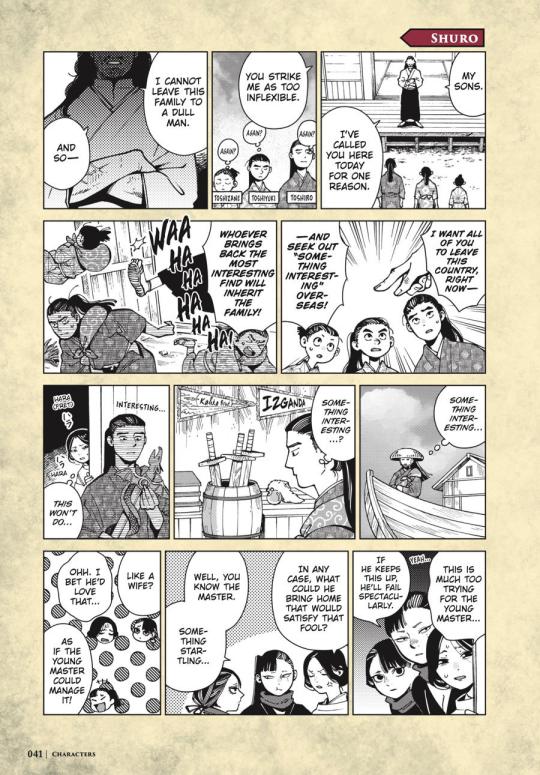
do you think toshiro was originally attracted to falin (whilst still being irritated by many of her same traits in laios) because he thought his father would find her interesting???

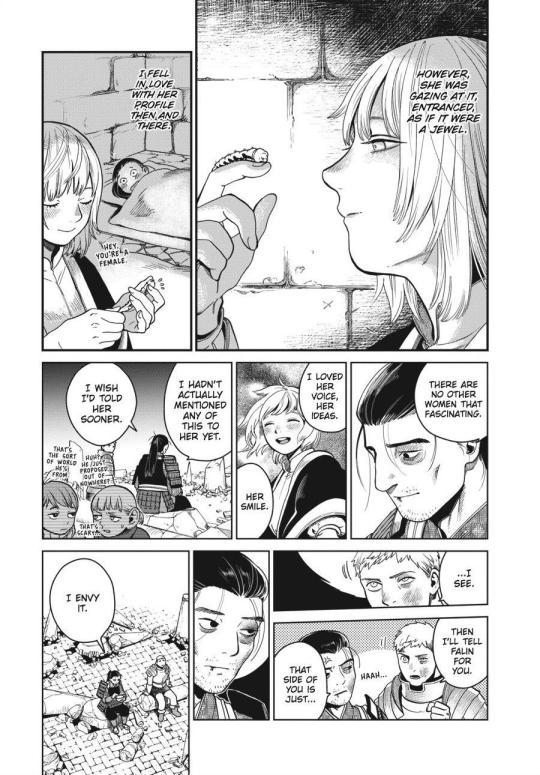
#undescribed#eliot posts#dunme#dungeon meshi#dm spoilers#idk how i feel about him#my first impression was positive bc he had a cool character design (and i found him quite handsome personally lol)#but also he was mean to laios :(#but also laios was asking him intrusive questions and messing up his name#but also he should have just spoken up instead of expecting others to just read his mind#but also dude was a nobleman in what looks like feudal era japan#which to my (albeit limited) historical knowledge had even more intense politeness rules than like. the victorian era#so if the dunmeshi world is like the irl era then it could be a cultural thing that he felt he couldn't vocalize that stuff directly#and also he was in love with falin and seemed to like her weirdgirl tendencies. which i appreciate and respect. like. me too dude.#but also how much was genuine feelings and how much was seeing her as a novelty?#BUT ALSO did his family own fucking SLAVES??? and was he cool with that???#or did i miss something/am i misunderstanding something?#like is the guy having a sixpenceee moment here#or am i just misunderstanding context/history here?
39 notes
·
View notes
Text
“he helped push a narrative where caiti is a liar” girl she literally admitted to lying
#like I have sympathy for her apparent discomfort#but I’m also not gonna be gaslit into thinking that her first and second statement don’t include obvious contradictions#the job of the eyewitness is to provide their account of what happened#which is what Dream did . all he said was that she appeared to be reacting positively and that George’s account seemed more accurate#to what he saw. which caiti outright confirmed when she came out with her second statement saying that yeah she stood up#multiple times and was laughing and smiling while uncomfortable (instead of being silent and still like she first said)#like there are multiple places where we have proof of her lying or she literally admitted it herself idk what to tell you
27 notes
·
View notes
Text
i just realized - theo isnt jewish is he??? maybe dont make your cape name Golem if ur not actually jewish???
#unless my jewish followers weigh in on this and say they dont care#in which case i will retract it#but from my position it seems a bit odd :/#wormblr#parahumans#worm spoilers#worm liveblog
59 notes
·
View notes